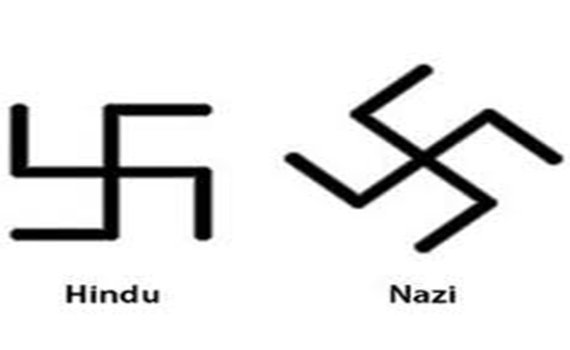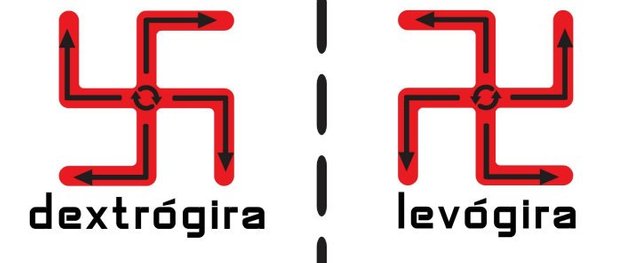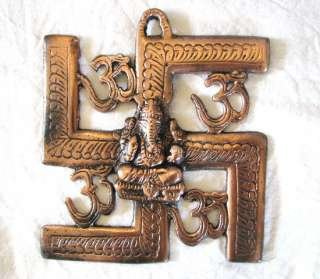

Many people give the swastika the meaning that the Nazi empire imposed on it, both directly and indirectly.
However its meaning is positive and goes back thousands of years before Adolf Hitler would think to turn it 45º and include it in his flag.
Mucha gente otorga a la esvástica el significado que la imposición del imperio nazi le atribuyó, tanto de manera directa como indirecta.
Sin embargo su significado es positivo y se remonta miles de años antes de que a Adolf Hitler se le ocurriera girarla 45º e incluirla en su bandera.



The two types of swastika differ basically by the side to which its upper arm points.
The dextrógira usually is more used by the Hindu ones and the levógira by the Buddhists.
There is a Occidental myth in which it was mistakenly believed that the dextrógira swastika was symbol of good luck and that the levógira implied a bad omen.
Los dos tipos de esvástica se diferencian básicamente por el lado hacia el que apunte su brazo superior.
La "dextrógira" suele ser más utilizada por los hinduistas y la "levógira" por los budistas.
Existe un mito occidental en el cual se creía erróneamente que la esvástica dextrógira era símbolo de buena suerte y que la levógira implicaba un augurio nefasto.



In general terms it is a symbol of good luck, happiness, success, health, prosperity, wealth and well-being...
For Hindus it is directly related to the four goals in the life of men that are quoted in Dharma Sastra: Dharma or religious duty, Artha or wealth that allows one to attain pleasure, Kama or pleasure in itself and Moksha or liberation from the cycle of reincarnation.
For Buddhists it simply means the whole or eternity and is usually represented in the chest of some Buddha statues.
En términos generales es símbolo de buena suerte, de felicidad, de éxito, de salud, de prosperidad, de fortuna y bienestar...
Para los hinduistas tiene relación directa con los cuatro objetivos en la vida de los varones citados en los "Dharma Sastra": "Dharma" o deber religioso, "Artha" o riqueza que permite alcanzar el placer, "Kama" o el placer en sí mismo y "Moksha" o liberación del ciclo de reencarnación.
Para los budistas significa simplemente "el todo" o "la eternidad" y se suele representar en el pecho de algunas estatuas de Buda.



In some parts of China, swastikas are placed on vegetarian products for strict Buddhists.
Also in that country these symbols are woven on children's clothing to protect them from evil spirits.
The Christians already used it in the Roman time, time in which Christianity was persecuted, like way to disguise the cross of Christ.
Hindus use it everywhere; From walls of houses and temples to the head of envelopes or personal gifts.
En algunos lugares de China se colocan esvásticas sobre productos para vegetarianos, destinados a budistas estrictos.
También en dicho país se tejen dichos símbolos sobre la ropa de los niños para protegerlos de los malos espíritus.
Los cristianos ya la utilizaban en la época romana, tiempo en el que el Cristianismo era perseguido, como manera de disimular la cruz de Cristo.
Los hindúes la utilizan por doquier; desde paredes de casas y templos hasta en el encabezado de sobres o en regalos personales.



The Nazis adopted the swastika as a symbol starting in 1920 although it was already being used by German nationalist movements a few years ago.
They considered it a symbol of the struggle for the victory of the Aryan supremacy.
The theory of German descent to the Aryan race comes from the early Aryans in India, who were the prototype of white invaders in which the Nazi theorists based the emblem as a major part of their flag.
Los nazis adoptaron la esvástica como símbolo a partir de 1920 aunque ya estaba siendo usada por los movimientos nacionalistas alemanes unos cuantos años antes.
Lo consideraban un símbolo de la lucha por la victoria de la supremacía aria.
La teoría de la ascendencia alemana respecto de la raza aria proviene de los primeros arios en la India, que fueron el prototipo de invasores de raza blanca en la que los teóricos nazis basaron dicho emblema como parte principal de su bandera.

Sources/Fuentes
https://es.wikipedia.org/wiki/Esv%C3%A1stica
https://es.answers.yahoo.com/question/index?qid=20080726093708AA8gfFe
yeah, i live in Germany, and when people see the symbol swastika the first thought is the negative one
most of the ppl dont know that it has another meaning as well
Downvoting a post can decrease pending rewards and make it less visible. Common reasons:
Submit
Yes, the original meaning is that real good and spiritual.
Downvoting a post can decrease pending rewards and make it less visible. Common reasons:
Submit
It's always a shame when wankers steal legitimately cool flags. Like, the Gadsden Standard is awesome. It has a snake coiled up with the badass words, "Don't tread on me" written under it. But now the Tea Party and all sorts of crackpots wave it around and legitimate flag enthusiasts such as myself can't say we like it without looking like a crazy nationalist. :(
Downvoting a post can decrease pending rewards and make it less visible. Common reasons:
Submit
I had a relative that died in the concentration camp.. He fell outta the guard tower
Downvoting a post can decrease pending rewards and make it less visible. Common reasons:
Submit
My condolences.
Downvoting a post can decrease pending rewards and make it less visible. Common reasons:
Submit
Funny
Downvoting a post can decrease pending rewards and make it less visible. Common reasons:
Submit
I'm glad somebody got it..
Downvoting a post can decrease pending rewards and make it less visible. Common reasons:
Submit
In India there is no negative with swastika too. It is just a symbol, no more
Downvoting a post can decrease pending rewards and make it less visible. Common reasons:
Submit
Well a few of my friends are german and they associate this nazi sign as a symbol of disgrace to them. they don;t want to talk about it neither do they want to joke or see it.
Downvoting a post can decrease pending rewards and make it less visible. Common reasons:
Submit
Well, I can understand that everyone associated to the 45° turned swastika the nazi meaning.
But in the origin, the real swastika is a really good symbol.
Downvoting a post can decrease pending rewards and make it less visible. Common reasons:
Submit
Gracias por compartir Dresden, es importante tener la información correcta y no permitir que se distorsionen los significados originales, sobre todo cuando su connotación es positiva y ha sido tergiversada como en este caso.
Hoy en día vemos esto con mucha simbología que la gente en el poder ha adoptado y utilizado negativamente e incluso adrede con el afán de que la gente piense que esos símbolos y conocimientos son negativos, para asi alejarlos de la verdad y quedársela para ellos solos. Veo que esto sucede con símbolos como el ojo de horus, o la pirámide que de igual manera hoy son vistos de manera negativa por la propaganda que se ha hecho en ese contexto pero nada mas equivocado y alejado del verdadero poder y conocimientos encerrados en estos símbolos. Te sigo.
Downvoting a post can decrease pending rewards and make it less visible. Common reasons:
Submit
Si, es cierto esto. Hay cantidad de símbolos de los que la mayoría de la gente tiene conceptos erróneos o al menos muy limitados.. Los símbolos no sólo encierran significado...tienen poder. lo estudia la Cimatica
Downvoting a post can decrease pending rewards and make it less visible. Common reasons:
Submit
Gracias, me parece muy ilustrativo to escrito!
Downvoting a post can decrease pending rewards and make it less visible. Common reasons:
Submit
Didn't work so well for the Nazis, then.
Downvoting a post can decrease pending rewards and make it less visible. Common reasons:
Submit